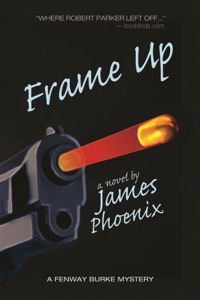 Written by James Phoenix – If imitation is the sincerest form of flattery, it’s a shame Robert B Parker is no longer around. If he was, he’d be mighty flattered by recent crime fiction. Ace Atkins recently took over the Spenser series, and Atkins’ Lullaby was a loving pastiche. Now debut author James Phoenix is billed as ‘the next Robert B Parker’. Fenway Burke is Phoenix’s attempt to emulate Spenser in Frame Up, the first novel of a planned series.
Written by James Phoenix – If imitation is the sincerest form of flattery, it’s a shame Robert B Parker is no longer around. If he was, he’d be mighty flattered by recent crime fiction. Ace Atkins recently took over the Spenser series, and Atkins’ Lullaby was a loving pastiche. Now debut author James Phoenix is billed as ‘the next Robert B Parker’. Fenway Burke is Phoenix’s attempt to emulate Spenser in Frame Up, the first novel of a planned series.
In Frame Up, Fenway Burke’s buddy Tiny Dan Murphy (a Hawk-like sidekick, for those keeping score at home) asks for help exonerating Shawn Corbett, a family friend who was convicted of murder. Fenway takes the case. Corbett isn’t terribly sympathetic, but Burke stays on the case because it is important to Tiny. Fenway also stays on the case because a powerful millionaire, a crooked cop and a high-priced hitman try to get him to lay off. Fenway is fairly convinced that Corbett is innocent of the murder charge (though hardly an innocent) from the beginning. The real task is to find the evidence that will prove it. This is difficult when all the alleged witnesses to the murder are being murdered one by one.
Along the way, Fenway becomes enamored with shapely Megan Griffin, the public defender who originally handled Shawn Corbett’s case. Solving the case, saving his own hide and protecting Megan is not easy task for Fenway Burke. Fortunately for Burke, Tiny Dan and his henchmen, led by the redoubtable Ax, provide support.
Phoenix is clearly aping Parker’s writing and characters, though the former is not nearly as facile as the latter. The prose in Frame Up can be clunky, and Fenway Burke lacks the organic, unostentatious tough-guy dialogue that made early Spenser novels genre classics. James Phoenix’s novel does resemble the Spenser novels in some respects, not least because the plot of Frame Up bears a striking resemblance to Parker’s Small Vices. Both have PIs seeking to prove the innocence of unlikeable convicts and both novels inflict near fatal injuries on their protagonists. Spenser lets his hair and beard grow long as a disguise, while Burke shaves his head and beard to avoid being recognised. Spenser uses James Butler Hickok (Wild Bill) as an alias, while Burke is Edward Teach (Blackbeard). Both novels have similar climactic meetings with the murder victim’s romantic partner.
This is not to say that there is no value in Frame Up. It is unfortunate, however, that most of the enjoyment I received from Frame Up was residual, being left over from the Parker plot that Phoenix is reworking. The characters in Frame Up are clearly intended to replicate Robert B Parker’s. Fenway Burke and his pals are not as finely drawn as Spenser and his associates, however. And Phoenix’s characters do not develop in any way that suggests they are more than imitations of Spenser, Susan Silverman, Hawk, etc.
Still, some of the Parker magic seeps through Frame Up. And unlike later Spenser novels, Frame Up is more than a running narration of what the protagonist ate, wore and said. The plot of Frame Up may lag in spots, but the author provides an unexpected plot twist that even Parker did not utilise – at least not in Small Vices. While his characters are at best two-dimensional, Phoenix does give readers a larger-than-life hero to root for, and plenty of shoot-outs and fisticuffs for entertainment. Fenway Burke may be unsatisfying as a hardboiled hero in the mold of Marlowe, Hammer, Archer and Spenser. Nonetheless, with tempered expectations, Fenway is a serviceable, if derivative, action hero.
Grey Swan Press
Print
£15.93
CFL Rating: 3 Stars








